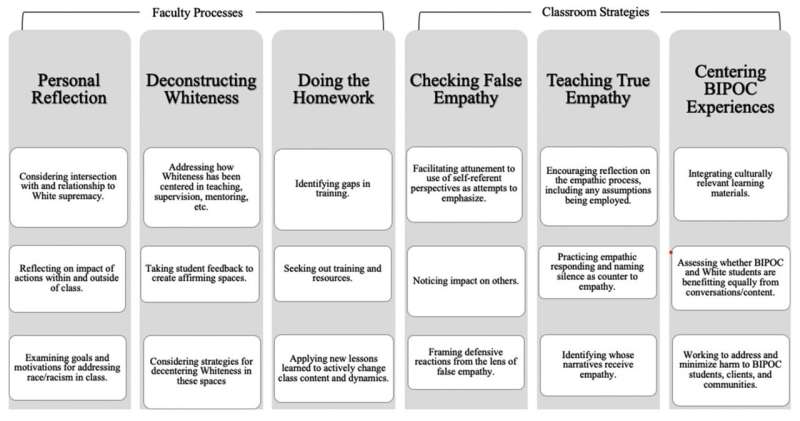This article has been reviewed according to Science X's editorial process and policies. Editors have highlighted the following attributes while ensuring the content's credibility:
fact-checked
proofread
Counselors need better training to help BIPOC clients, educators say

Empathy is the cornerstone of the care that therapists provide their clients. But people of color often find white counselors misunderstand them based on biases and assumptions, according to a new journal article in Counselor Education and Supervision.
Counselors need to learn a form of interaction called cultural empathy, which involves honoring racial and cultural differences to better grasp a client's experiences, says Hannah B. Bayne, Ph.D., a counseling educator at Virginia Tech and lead author of the new article. The paper is part of a special issue on anti-racism training for counselors to help them better serve Black, Indigenous and other people of color (BIPOC).
Counselors often overlook the way systemic power and privilege influence their work with BIPOC clients, Bayne and her co-authors explained. They can develop a false form of empathy, misinterpreting what BIPOC clients tell them while assuming they fully understand.
White counselors can be particularly prone to this error in empathy, based on racial identity and lack of awareness, and therefore may insert their own experiences to interpret a BIPOC client's responses, without understanding how that thinking might impede their ability to fully hear the client's perspective. This tendency can unintentionally harm the client, making them feel judged or invalidated.
"An effort for empathy, no matter how well-intentioned, is not truly empathic if the person on the receiving end does not feel understood or cared for," Bayne said. "When you throw in all of the ways our experiences are different, there are quite a lot of factors that can make empathy miss the mark."
Forming the root of the problem are shortcomings in counselor education, the authors assert. Multicultural curricula typically contain chapters focused on specific populations, leading to sweeping generalizations about a particular group, they write. Those texts also tend to focus on the struggles of marginalized groups, rather than their strengths. The training sends the message to BIPOC students that the effort to "teach and engage around topics of race falls squarely on their shoulders," they add.
Bayne and her co-authors recommend several steps to correct the training weaknesses, including characterizing BIPOC people as strong and resilient rather than simply oppressed. Students should also learn how to develop empathic skills that move beyond their own white-centric experiences, they add.
Such training can make counseling far more effective for people of color, the authors conclude.
"To be fully seen and respected as an individual can be a powerful healing experience," Bayne said, "and cultural empathy can enable this cathartic process."
More information: Hannah B. Bayne et al, Building cultural empathy and deconstructing Whiteness in counselor education, Counselor Education and Supervision (2023). DOI: 10.1002/ceas.12263
Provided by American Counseling Association




















